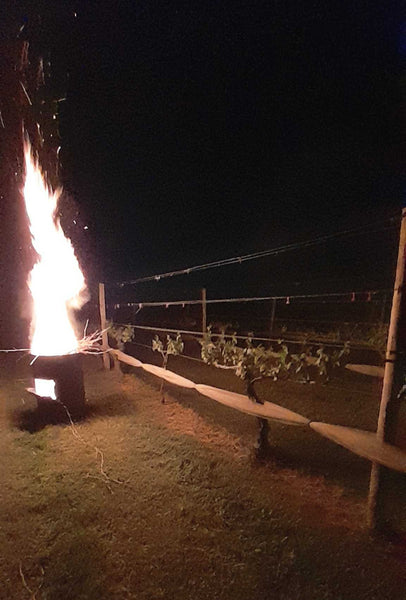A Winter’s Tale
While the days are beginning to get longer, the temperature is creeping lower and lower. Just as we adorn ourselves with scarves and jackets, Unionville’s grapevines must also prepare accordingly for the harsh temperatures ahead. Lucky for them, they have a dedicated team of viticulturalists to help them stay happy in the most brutal of weather!
Grapevines, like most woody plants, go dormant in the Wintertime to protect themselves and their new growth from frost. However, grapevines are very sensitive plants, especially in wetter, colder regions like the mid-Atlantic. This sensitivity means that the vines are still susceptible to cold damage in dormancy. With that in mind, the vineyard team at Unionville likes to take a couple of precautionary measures, so when the vines wake up in Springtime, they are ready to bud, flower and grow the grapes used to make some of the tastiest wine on the East Coast.

With February fast approaching, pruning season is off and running. These next couple of months are the perfect time to monitor and correct growing patterns and vigor for the coming Summer by cutting back vine spurs to just a few nodes. This assures even and healthy canopy growth, as well as an appropriate and manageable crop load (for both the vines and the winemaking team).
Vines are being pruned, barrels are being topped, tank whites are being bottled and wine is being poured and enjoyed in our tasting room all day long. It's winter hibernation for most, but Unionville is always in full swing.
-Conor Quilty
Leave a comment
Comments will be approved before showing up.
Also in Unionville Grapevine

The Best Wines are the Ones You Fight For
We picked from 5am that day until a little past midnight, almost 19 hours of harvesting. The pick was only interrupted for bathroom breaks, pizza, and eventually some beers to keep morale high. I think the high morale beer was Miller High Life, although the details are fuzzy and it would only have been selected ironically. It was the most tenacious day I can recall in the field here. We picked nearly 10 tons from three different vineyards, finishing with the Pheasant Hill Chardonnay. We saran wrapped the bins during transport and weighing back at the winery as Ophelia's first raindrops splashed down just after midnight.


